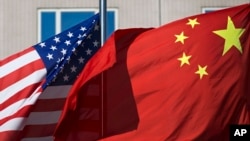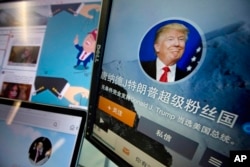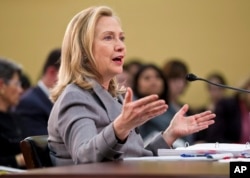How do the two leading U.S. presidential candidates differ in their policies toward China? In the latest VOA China 360 podcast, senior advisers to Hillary Clinton and Donald Trump provided exclusive insight into three key differences between the Democratic and Republican nominees.
Expertise
In an interview with VOA last month, Clinton foreign policy adviser Laura Rosenberger drew a sharp contrast between the foreign policy expertise of real estate tycoon Trump and her boss, a former U.S. secretary of state, U.S. senator and first lady.
"Hillary believes the U.S.-China relationship is maybe the most complex and consequential in the world today and would approach it by expanding cooperation wherever we can, and standing up when China is working against our interests," Rosenberger said, while describing Trump as "somebody who has a very simplistic view of the relationship with China — one that, as a matter of concern, is potentially informed by his own business interests."
Rosenberger cited U.S. media reports alleging that Trump owes significant debts to a Chinese bank and quoting him as raising the possibility of cutting economic ties with China if it prevented Chinese people from visiting the U.S. and staying at Trump hotels.
"Trump would be motivated by the fact that he believes China is harming his businesses. The idea that America could just cut off ties with China is ludicrous. We have so much that we need to work with China on, that we simply cannot wall ourselves off from the rest of the world," she said.
Trump senior defense adviser Alexander Gray pushed back against those criticisms in a separate VOA interview last month.
"Trump has laid out a vision for rebuilding our military and strengthening our alliances, including in the Asia-Pacific, with a ballistic missile defense system. This vision is anything but simplistic — it will provide the stability we need in that critical region," Gray said, adding that Trump's experience as a negotiator "who gets optimal outcomes for himself, his businesses and other parties" is the kind of experience needed to deal with some of Asia's "thorny issues."
Gray said Trump would provide more reassurance to America's Asian allies than Clinton did when she served as President Barack Obama's first secretary of state.
He said Clinton initiated a rebalance to Asia, telling U.S. allies that "we are going to be back in force in the region," while in reality the U.S. "cut back on our Air Force and Navy shipbuilding, sent some ships to Singapore and Marines to Darwin, Australia, and that is about it."
Gray said U.S. allies "can see that the trends are not good," citing North Korea's four nuclear tests during the Obama presidency, China's recent reclamation of 3,200 acres of land to create artificial islands in the disputed South China Sea, and its declaration of an Air Defense Identification Zone in the East China Sea in 2013.
"Instead of talking about an indefensible record, [Clinton's team] wants to talk about innuendo regarding Donald Trump," he added.
South China Sea
Rosenberger said Clinton's policy on South China Sea sovereignty disputes involving China and its neighbors would be to uphold her 2010 declaration, made while she was secretary of state, that the U.S. "opposes the use or threat of force by any claimant" and has a national interest in a "collaborative diplomatic process by all claimants for resolving the various territorial disputes without coercion."
"The U.S. will not take a side on the territorial disputes, but it is important that we not militarize the South China Sea, where we see so much commerce going through, where freedom of navigation is so critical to American businesses," Rosenberger said. "So for Hillary, this is about making sure that China is playing by the rules, while cooperating where we can — for instance, on climate change, where we have seen a lot of U.S.-China cooperation in recent years."
Gray said that kind of dual-track strategy toward China misses a key element.
"Trump is saying: We are going to make sure that the U.S. military has the most comprehensive buildup since Ronald Reagan was president, and we are going to invest in a missile defense system that our allies South Korea and Japan and our Southeast Asian allies want," he said. "Once we have done that, we can say to China: You stepped out of line, your actions are not in keeping with peaceful, liberal order in the region. And we will have the teeth to show that the U.S. is credible."
Gray said the Obama administration's occasional freedom-of-navigation exercises in the South China Sea lack such credibility.
"What China is doing in the South China Sea violates international law, as we have seen in the July ruling by the international tribunal in The Hague. What Trump is going to say is: We are going to restore our naval power, and when we assert our freedom-of-navigation rights like every power in the world, we will do it appropriately. There will be no ambiguity about it."
North Korea
Another focus of both candidates' advisers is China's relationship with its longtime ally and impoverished neighbor North Korea, a state that has drawn international condemnation for conducting a series of nuclear and missile tests this year.
Rosenberger said those North Korean tests are of deep concern to Clinton.
"She believes that we simply cannot and will not allow North Korea to obtain a deliverable nuclear weapon, which would be a direct threat to the U.S.," Rosenberger said. "She also believes that we need to work with our allies to increase the pressure on North Korea, so that it understands that its only choice is to give up its nuclear program. So far, they have been sanctioned, but not to a degree that has inflicted pain."
She said Clinton also would work with China to impose significant additional pressure on North Korea.
"That means doing some things that China may not like — taking a look at our defense posture and making sure we are doing everything we need to do to protect the U.S. and our allies from the threat North Korea poses. It is incumbent on China to make sure that the threat from North Korea is removed, so that China does not face that same kind of pressure from the U.S.," Rosenberger said.
Gray said Trump would seek to negotiate with China rather than pressure it to restrain North Korea.
"Trump is willing to negotiate from a position of strength with China to see if we can come to an agreement. He wants to say it is not in China's interests to have this reckless, rogue nuclear regime on its border, especially when it is showing signs of strain," Gray said, pointing to the August defection of North Korea's deputy ambassador to London and South Koran media reports of senior North Korean military and government officials being executed this year.
"Trump is willing to look at the [U.S.-China] relationship holistically and see if Beijing can play a constructive role with Pyongyang," he added.
VOA Ukrainian service journalist Tatiana Vorozhko contributed to this report.







